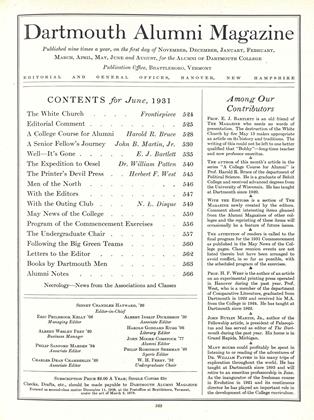Following is as clear-headed and vigorous a picture of how the citizenry of New Hampshire view President Hopkins as we have ever seen. On April thirteenth, the President addressed The Laymen's League of the of the Unitarian Church in Concord, N. H. Comment in The Concord Monitor was as follows: "The audience which heard President Hopkins of Dartmouth Monday evening was a good audience, for some of it was critical. Some present were conscious that recently Dr. Hopkins had made in Chicago a very wet statement. Others who confuse internationalism and such things as communism, were prepared to resent any remarks which might be contrary to their sense of self-sufßciency.
"When Dr. Hopkins declared someone 50 years ago had said a law which went contrary to public opinion and action was a poor law, the prohibitionists felt injured, and when he raised the question as to how a debtor nation could repay the United States in the face of high tariff walls, the isolationists and D. A. R. nationalists felt that treason was abroad. When Dr. Hopkins indicated that morals might often be considered simply customs, the denominationalists were certain he was irreligious.
"Against those who were thus doubtful about their man, were others who franklyadmired the speaker, considered his breadth as greater than their own and welcomed the opportunity to make a contact which might help to broaden them.
"The doubters were quick to reach conclusions about Dr. Hopkins' every reference. The admirers noted that his choice of words and his qualifying statements and adjectives were carefully chosen. The doubters instinctively felt that here was a dangerous element at large which must be combatted. The admirers were certain that daily contact with this man would soon eliminate the doubters in this world.
"Some there were who probably did not hear President Hopkins because he spoke in a Unitarian church. For to some, that church is outside the pale. We have, all of us, yet to cross great barriers of prejudice, for and against almost everything."
 View Full Issue
View Full Issue
More From This Issue
-
 Class Notes
Class NotesCLASS OF 1930
June 1931 By Albert I. Dickerson -
 Article
ArticleA Senior Fellow's Journey
June 1931 By John Butlin Martin, Jr. -
 Class Notes
Class NotesCLASS OF 1929
June 1931 By F. W. Andres -
 Article
ArticleThe Dartmouth Expedition to the Island of Oesel
June 1931 By Wm. Patten -
 Class Notes
Class NotesCLASS OF 1910
June 1931 -
 Lettter from the Editor
Lettter from the EditorEditorial Comment
June 1931
Article
-
 Article
ArticleFAST TRAIN IS KNOWN AS "THE DARTMOUTH FLYER"
NOVEMBER 1927 -
 Article
ArticleA WAH HOO WAH!
April 1945 -
 Article
ArticleAlumni Dinner Schedule
February 1949 -
 Article
ArticleKenan Professorship Endowed
DECEMBER 1967 -
 Article
ArticleEnergy: thrift amidst a $1.4 million budget
December 1976 By AMY K. DUNBAR '78 -
 Article
ArticleThe College
May 1977 By Robert Hodes '46

